


Connecting-The-Dots
While Covid certainly has been plenty devastating in Malaysia and around the world, and with shockingly broad destruction of local economy, it has not been nearly as destructive as it could have been.
Without innovation and technological progress, the pandemic and the lockdowns could extend as long as three years or more and would result in a generational cataclysm. We are coming out of Covid years early, with many livelihoods and businesses preserved, compared to what we had any right to expect, and overwhelming credit goes to technology as well as innovation-driven start-ups. Covid presents a fundamental shift that would help fuel a whole generation of start-ups in the region particularly within consumer-focused sectors that have been slow to embrace technology pre-Covid namely Healthcare, Education and Agri-Food. Most are aware of how Moderna – a product of the venture capital system – created the first mRNA Covid vaccine within days of receiving the genetic code for Covid by email. Coincident with the imposition of lockdowns, the pandemic has provided the final push for Telemedicine to take off where it plays an essential role in providing remote care for patients. The health-economic crisis is the turning point for general mental wellbeing, and we have seen innovative start-ups such as Naluri Hidup and Thoughtfull deliver mental health care to more affected individuals and make the service virtually available.
Adoption of online learning has also exploded because of the pandemic and imposition of lockdown. Schools now use virtual dashboards, where teachers post everything from homework assignments and test scores to videos of children reading book reports. Start-ups like Pandai began designing technologies to personalise the learning process such as software that adapts based on how a student learns best. Innovation from start-ups will change how we measure success in the classroom – teachers and parents can get detailed reports with a wide range of metrics and most of them can be ascertained real-time! Technology has avoided the prospect of a Great Depression and Food Crisis as much of the supply chain kept operating.
Adoption of digital logistics, online marketing and payments has exploded, as many suppliers and businesses reach out to customers virtually. Restaurants and grocery stores pivot to delivery and contactless payments, made possible by start-ups like Grab, Food Panda, and Happy Fresh. All of this take place at the convergence of demographics and lifestyle shifts that also shape the direction of food’s future.
The experience of Covid has made it crystal clear both how important technology and technology-enabled businesses are to economic resilience and sustainable community. Despite economic uncertainty, the pandemic has led to a surge in start-ups. “3P” factors namely Pandemic, Politics and Policies have created an environment for innovation-driven enterprises to thrive. Pandemic and politics have accelerated digital transformation in how businesses operate, how supply chain interacts, how products and services are marketed as well as delivered, and how consumers behave.
In terms of policies, government’s push for investment especially on digital infrastructure and domestic demand provide conducive environment for start-ups. Accommodative monetary policies by the central bank means that financial markets are awash with liquidity. Prevailing low-yield environment also forces investors to look for higher yield assets and growth opportunities – more and more ended up in venture capital funds and benefitted hyper-growth start-ups.
In Malaysia, government believes that the development of innovation-led economy requires a vibrant venture capital industry. Venture capital functions as the gatekeeper and the bottleneck to the deployment of capital. As an investment house, Penjana Kapital’s approach in supporting innovation is the supply mechanism of “patient capital” and “growth capital”. We believe that venture capital holds social currency, and Penjana Kapital shall mobilise the capital to finance innovation that has growth potential as well as fund start-ups that seek to effectively solve current societal problems and deliver future needs. We currently face an unprecedented combination of compounding high-stake crises. These crises include the ongoing Covid that is endemic, with its health and economic impacts, the climate emergency with its increasingly dramatic consequences, and the growing concentration of wealth as well as social inequality. We are confident that some of the solutions would come from thriving future-ready start-ups in Malaysia and this region.


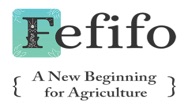
Market Context
Global agriculture market is expected to grow by 6% this year to USD10.2 trillion from US$ 9.6 trillion. By 2025, the market is expected to reach US$ 13.1 trillion at a 7% CAGR. Asia Pacific remains a key region accounting for 57% of the global agriculture market in 2021, driven by large (and growing) population and burgeoning middle class (and rising income as well as consumption). Despite its importance, agriculture in Malaysia only contributes about 8.21% of the GDP which translates to USS 27.7 bil.
Problem Statement: Food Production
80% of food Asia consumed is produced by smallholder farmers with 60% of them are in contract farming. Due to lack of scale, limited access to modern farming methods as well as knowledge, and inefficient supply chain, cost of production is fairly high, limiting productivity and growth potential. Moreover, the farming industry can be considered an aging industry as 65% of the farmer will retire in 15 years or less. Fewer people are willing to enter the industry due to low profitability and labour intensiveness in traditional farming, posing a structural challenge. By 2030 there will not be enough food produced for the world population as there will not be enough smallholder farmers. With world population expecting to reach 8.5 billion by 2030, demand for food will be at a staggering high. Crops production, farming activities and trade volume must increase to meet the needs of the ever-increasing population.
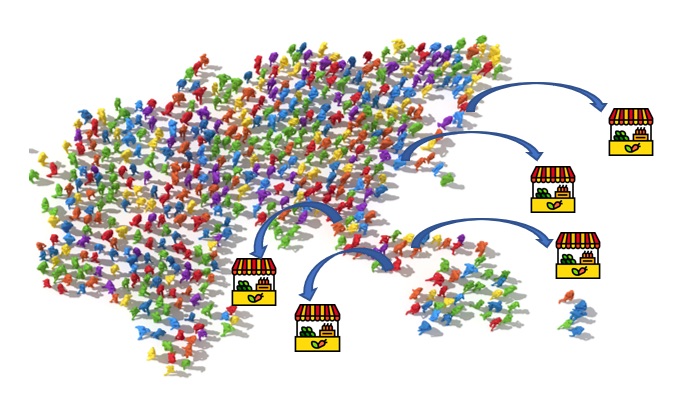
The problem statement is further complicated by climate change – it is getting harder to predict the intensity and frequency of precipitation, heat wave and other extreme events, all of which will impact agriculture production.
Solution: Technology Innovation & Investment
Agritech could be the answer to our food production problem. With the new technological advancement, farmers can invest to improve their effective yields with significant cost reduction. By using the data collected, farmers can make data driven decision to streamline and optimise their method in growing certain crops.
This presents an opportunity for start-ups and investors to fill up the market and address funding gaps in this nascent sector. The global Agritech market was valued at USS 17.4 bil in 2019 and it is projected to reach USS 41.2 bil in 2027. it is expected to grow at a CAGR of 12.1% from 2020 to 2027. For context, in 2019, Asia Pacific stood second in the Agritech market with a share of 29.7%.
Who is Fefifo?
Fefifo is an Agritech company that is focusing on digitalising and standardising small farming using data, science and technology, to boost productivity and eventually profitability. Fefifo is also cultivating a culture of knowledge sharing in their ecosystem.
It provides modern, ready-to-farm space as a service, thus allowing smallholder farmers and young unemployed agri-graduates to start their own commercial farming business with zero capital expenditure (capex) whilst giving them access to modern agri-science, technology and training.
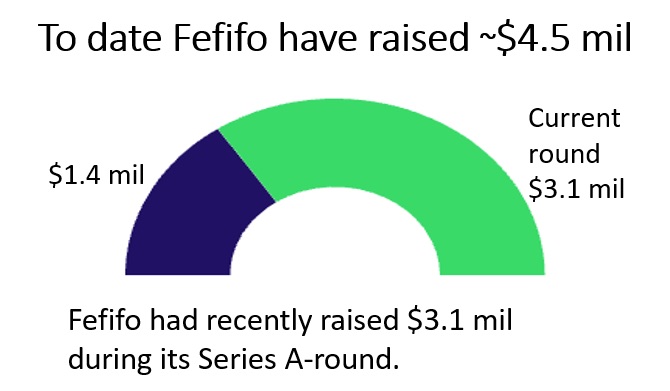
Fefifo Strength
The co-farming model converting a business that relies on high capex to a pure operating expenditure play. Fefifo is able to scale quickly by building modular farms as and when needed. This model will ultimately improve the success rate of owning a farming business.
The proprietary platform, DDFN, offers standardised and easy-to-follow growing procedures to ensure predictable harvest. DDFN also has a check-and-balance system in place to monitor the entire seed-to-sale process, which means they can detect any potential issues and solve them when it arises.
Fefifo’s growth opportunity
Fefifo’s expansion plan into Indonesia, the largest market for agriculture in Southeast Asia, will allow them to tap into a new and a bigger market. The large number of smallholder farmers in Indonesia and low technology adoption present an opportunity as Fefifo’s proposition appears more compelling and agropreneur acquisition easier. Expansion into Indonesia will allow for research in a vast range of crop portfolio which can be added into DDFN. Fefifo also have plans to build modular farms that come with aquaculture in order to expand their offerings bringing more value to agropreneurs.
Something to keep in mind
Fefifo raised one of the largest Equity Crowdfunding (ECF) in Malaysia of ~$756,590 which translate to over 1000% of their initial funding target.
During the ECF round they have attracted 53 angle investor of which almost 50 % are non-Malaysian investor. Over $146,000 was raised from a single foreign investor.
Fefifo is the first company to provide co-farming space that is ready to be commercialized in Southeast Asia.
The founders are very passionate about agriculture and have 70+ years of experience in diversified industries including marketing, consulting but most importantly agriculture.
We believe that smallholder farmer will be a major player in the region. Although Fefifo operates in a traditional industry, we believe that smallholder farmer will adopt the use of technology such as DDFN to ensure farmer are able to take advantage of data and management tools they previously would not have access to increase their return and in turn attract younger farmer and young argopurners.
This is all in line with the government strategy. As mentioned in Budget 2022 government has allocated RM 500 mil for AgroFood Facility and RM 200 mil for AgroFood Financing Fund. Finance Minister Tengku Zafrul said by improving food security while generating higher income this will attract more younger agropreneurs as the government continues to drive modernization of the agriculture sector.

Blockchain, Protocol and Digital Platforms
Blockchain technology has often been associated with cryptocurrencies such as Bitcoin since its popularity skyrocketed circa 2017. Since the emergence of Bitcoin into the mainstream headlines, adoption of cryptocurrencies and the blockchain technology had accelerated. Despite the popularity of cryptocurrencies, blockchain technology has many other use cases that could bring massive opportunities.
What is Blockchain Technology?
Blockchain technology enables all parties involved in a transaction to know with certainty what happened, when it happened, and confirm other parties are seeing the same thing without the need for an intermediary providing assurance, and without a need to reconcile data afterwards.
The two terms “blockchain” and “DLT” are often used interchangeably and to understand blockchain, it’s important to understand Distributed Ledger Technology (DLT) — the framework that underpins it.
DLT is a decentralized database managed by multiple participants, across multiple nodes. Blockchain is a type of DLT where transactions are recorded with an immutable cryptographic signature called a hash. The transactions are then grouped in blocks and each new block includes a hash of the previous one, chaining them together, hence why distributed ledgers are often called blockchains.
To put it simply, blockchain is an ever-growing, secure and shared recordkeeping system in which each user of the data holds a copy of records. The records can only be updated if all parties involved in a transaction agree to the update.
Blockchain Technology Brings the Dawn of Protocol Economy
In a 2020 report, PwC reported blockchain technology could boost the global gross domestic product (GDP) by USD1.76 trillion by 2030. The firm’s economists expect the majority of businesses to be using blockchain technology in some form by 2025. Once blockchain technology is adopted by the masses, the economic benefits are expected to rise exponentially.
Why is this the case?
To answer this, it would be useful to take a step back and assess the evolution of economic development since the 1850s up to the present. Following the Industrial Revolution, the world has taken a form of centralized economy where employees within companies provide goods and services. The corporate’s focus was on growth and wealth generation of shareholders. Fast forward to the present, the adoption of digital platforms for business transactions and online multi-party collaboration has led to a remarkable change in the way businesses operate. Digital platforms such as Alibaba, Amazon, Netflix, and Coursera have allowed for open innovation, content creation, business transparency, price discovery and have transformed the traditional ways of doing businesses across multiple industries. These platforms brought about a level of business dynamism and trust that enable the creation of on demand business transactions as an alternative to slower pace of long-term offline business relationships.
Getting into a stranger’s vehicle or home would be unthinkable 20 years ago. Through the use of historical positive feedback and endorsements made start-ups such as Airbnb and Uber a trusted platform as a mode of transportation and lodging. This form of trust creation works on two complementary approaches: one is through creating a greater level of trust in participant entities through transparency, ratings and information availability across platform users, and the other is reducing the need to have a high level of trust on business partners because of a trust in a centralized entity that controls the platform that can step in to help when needed. Thus, these approaches bring forth the need for the platform provider to assume the governance roles where they define the rules of engagement, pricing mechanisms, dispute resolution mechanisms, data management, privacy management, identity and permission management, amongst others.
The emergence of most commercial digital platforms has been through centralized trust in platform builders and managers. With the use of blockchain technology which by its nature is decentralized, immutable and transparent, a new economic model called the protocol economy emerges. This economic model is the antithesis of the centralized economy where it is permissionless, derives value from the community and prioritizes data sovereignty. Blockchain technology also directly contrasts the trust creation of the platform economy where the decision-making functions are done by the platform operator.
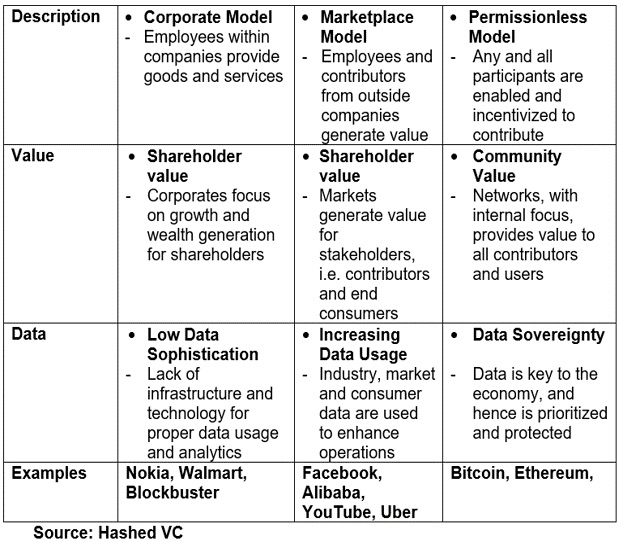
Blockchain Technology is based on trusting open source, open verified code where data management, transaction, monitoring and rules of engagement happen in a decentralized manner across multiple nodes. Integrity of the system is maintained through a consensus mechanism where validation takes place through advanced cryptography across multiple peers.
The Blockchain Value Proposition Pyramid
Blockchain technology has numerous use cases as illustrated in the above Blockchain Value Proposition pyramid. At the Base level are the two major Value Proposition that all blockchains provide: The Decentralised Data Infrastructure and Membership Management.
At the Intermediate level, many blockchain technologies offer the possibility of Automation of Business Processes as well as introduction of Crypto Economic Models. These two propositions also have technical, social and business challenges which are a barrier to their adoption.
While there have been experiments with Blockchain Models proposed by different start-ups or open-source communities, despite their immense potential they have not yet seen large scale real world adoption. At the peak of the pyramid, lies the holy grail of decentralization, which is the decentralization of governance itself. Because of the far-reaching implications of Decentralized Governance and the disruptive potential, its viability for implementation in existing Platforms remains the most challenging.
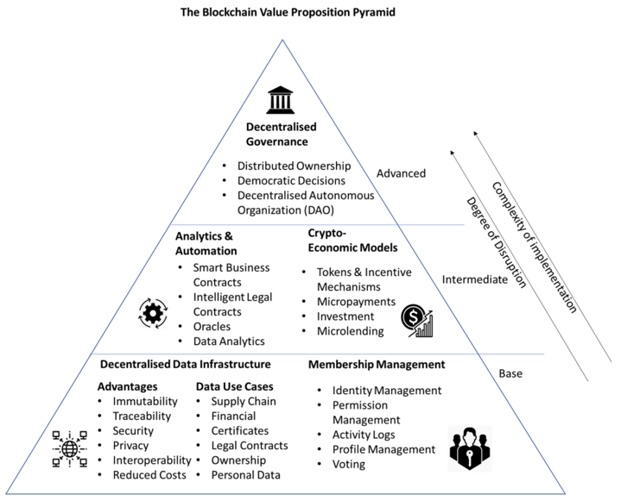
Conclusion
Blockchain technology’s emergence is one of the most impactful innovations to come out of this decade. The adoption of the blockchain technology is still in its infancy and there will be many iterations of success and failures before its true potential can be reached. In a lot of ways, the blockchain technology development could be compared to the start of the Dot Com boom of the 2000s where the internet was still in its infancy. Twenty years later, the internet space has matured to enable many business models that were not possible then. The sky is the limit for blockchain technology.

| Fund | Silicon Valley venture capital firm Andreessen Horowitz has launched a new USD2.2 billion fund to focus on backing the next generation of visionary crypto founders, and investing in blockchain technology development. | |
| Start-up | Vietnam’s latest unicorn, Sky Mavis has raised USD152 million from the likes of Andreessen Horowitz and Mark Cuban and at a nearly USD3 billion valuation to help grow its Axie Infinity play-to-earn (P2E) game that monetized via nonfungible tokens (NFTs). | |
| Exchange | Coinbase, the largest cryptocurrency exchange in the U.S., had its shares closed at USD328.28 in their Nasdaq debut in April 2021, giving the cryptocurrency exchange an initial market cap of USD85.8 billion on a fully diluted basis. | |
| Market Place | In Budget 2022, it was announced that the Bursa Malaysia would set up a voluntary carbon market (VCM) to stem outflow of carbon credits from precious local carbon sinks to international markets. This VCM would benefit from the adoption of blockchain technology to facilitate the transactions. |
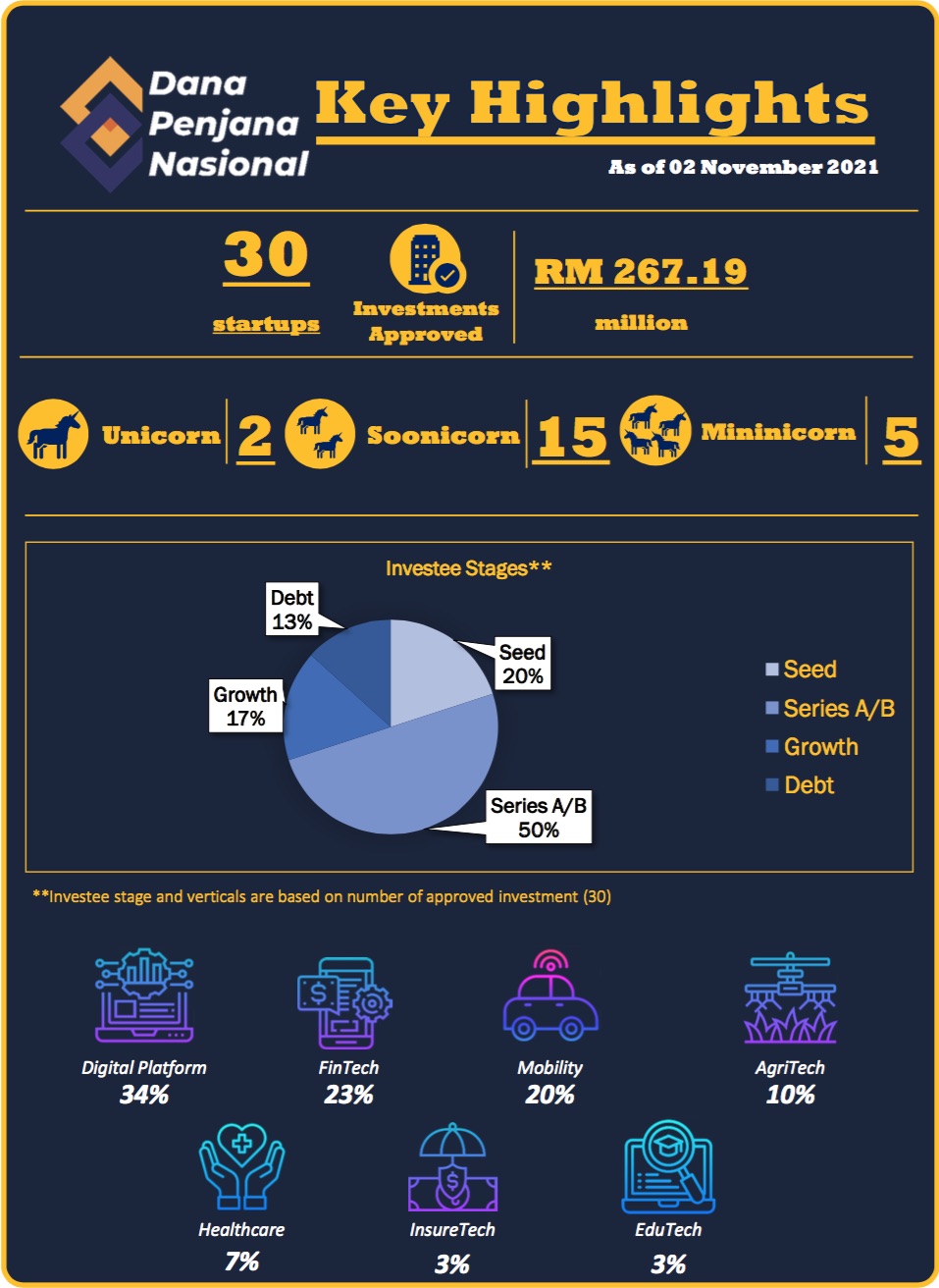
| DISCLOSURES AND DISCLAIMER |
This Newsletter is strictly informational and is issued Penjana Kapital Sdn Bhd (“PKSB”) on the basis that it is only for the information of the particular person to whom it was provided. This document may not be copied, reproduced, distributed or published by any recipient for any purpose unless Penjana Kapital Sdn Bhd’s prior written consent is obtained. This newsletter has been prepared for information purposes only and is not intended as an offer to sell or a solicitation to buy any securities, and/or any other product in Public or Private markets. Penjana Kapital Sdn Bhd is not making any recommendation to buy any securities or other product and the information provided should not be taken as investment advice.
It has been prepared without regard to the individual financial circumstances and objectives of persons who receive it. Penjana Kapital Sdn Bhd has no obligation to update its opinion or the information in this newsletter and Penjana Kapital Sdn Bhd recommends that you independently evaluate particular investments and strategies and seek the advice of a financial adviser prior to entering into any transaction. The appropriateness of a particular investment or strategy will depend on your individual circumstances and objectives. The information herein was obtained or derived from sources that Penjana Kapital Sdn Bhd believes are reliable, but while all reasonable care has been taken to ensure that stated facts are accurate and opinions fair and reasonable, we do not represent that it is accurate or complete and it should not be relied upon as such. All opinions and estimates included in this newsletter constitute our views as of this date and are subject to change without notice.
Penjana Kapital Sdn Bhd is not acting as your advisor and does not owe any fiduciary duties to you in connection with this newsletter and no reliance may be placed on Penjana Kapital Sdn Bhd for advice or recommendations of any sort. Nothing in this newsletter shall constitute legal, accounting or tax advice, or a representation that any transaction or investment is appropriate for you taking into account your investment objectives, financial situation and particular needs, or otherwise constitutes any such advice to you. Penjana Kapital Sdn Bhd makes no representations or warranties, express or implied, with respect to the accuracy of the information or fitness for any particular purpose and does not accept any liability (including but not limited to any direct, indirect or consequential losses, loss of profits and damages) for any use you or your advisors make of the contents of this newsletter or for any loss that may arise from the use of this newsletter or reliance by any person upon such information or opinions provided in the newsletter. This newsletter has been prepared by the analysts of Penjana Kapital Sdn Bhd. Facts and views presented in this newsletter may not reflect the views of or information known to other business units within Penjana Kapital Sdn Bhd. This information herein is not intended to constitute “research” as it is defined by applicable laws. This newsletter is not directed to or intended for distribution to or use by any person or entity who is a citizen or resident of or located in any locality, state, country or other jurisdiction where such distribution, publication, availability or use would be contrary to law or regulation. The information provided in this document has been obtained or derived from sources believed to be reliable. Penjana Kapital Sdn Bhd does not guarantee its accuracy or completeness and does not assume any liability for any loss that may result from the reliance by any person upon any such information or opinion. Such information or opinions are subject to change without notice, are for general information only and is not intended as an offer to sell or a recommendation/ solicitation to buy any securities, foreign exchange or other product.
